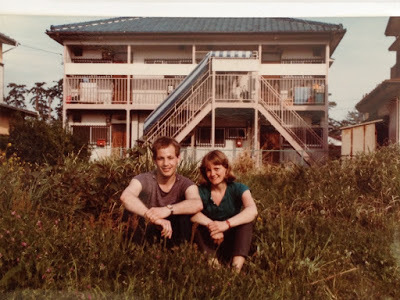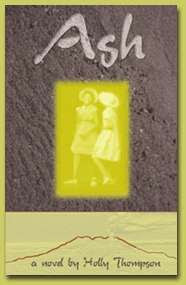SEVENTEEN and That Summer of 1985
I was eager yet hesitant to read Hideo Yokoyama's 2006 novel クライマーズ・ハイ(Climber's high) recently translated from Japanese by Louise Heal Kawai and released in English in 2018 as
Seventeen
. I knew it would churn up memories.
 One novel, three covers, from left: クライマーズ・ハイ(Japan edition); Seventeen covers for two English editions
One novel, three covers, from left: クライマーズ・ハイ(Japan edition); Seventeen covers for two English editions
This is the descriptive copy for Seventeen:

We both taught English in Japanese high schools, and we'd signed on for a third year, but that summer of 1985 my husband's 18-year-old brother was dying of renal cancer back in Ohio. We'd learned in May, just two months after he'd traveled to Japan to visit us, that he likely only had a few months but would undergo treatment hoping for more time.
Our students and colleagues in Japan helped fold senbazuru--1,000 paper cranes. My husband traveled home during a week when, incredibly, his brother was well enough to be up and about. Soon after my husband returned to Japan though, his brother's condition deteriorated.
We waited out the time thousands of miles away. The distance from family in the U.S. was painful--letters and our expensive landline were our only means of connection. We leaned on Japanese friends and fellow teachers for support. When the end came in early August, we were in Kyushu at the home of my husband's best friend from his time living in Kyoto. We went outside, looked up at the stars in the dark Kagoshima night and wept. The world seemed changed.
My parents were also visiting that summer. Before we'd visited Kyushu, I'd taken them north to Urabandai, and while there, my father shared that he had been diagnosed with Parkinson's disease. The weight of this upsetting news added to the burden of family grief I was lugging around that summer.
We left Kyushu and returned to Fujisawa. My parents left Japan on August 11, just before Obon. Then on August 12, Japan Airlines flight 123 crashed into a mountain in Gunma. We were glued to the TV and newspapers as the immensity of the disaster unfolded: rescue crews waiting to reach the crash site until the following day; 520 dead, just 4 survivors; one surviving girl being airlifted from the wreckage; the discoveries of last messages written by passengers as the plane descended . . .
This national grief, which blended with the other losses of that summer, inevitably and ultimately wove its way into my fiction writing. My novel Ash is set during the summer of 1985 in Kagoshima and Kyoto; protagonist Caitlin is coping with unresolved grief from a loss experienced as a child in Kyoto.

For me, reading Seventeen, with the JAL 123 crash as the central event of the story, was a complicated experience. I wanted to focus on the the layers of the various subplots--protagonist Yuuki's newsroom dramas, family conflicts, the mountain climbing experiences, but I came to full stops whenever details of the crash were described. The novel catapulted me right into that summer of 1985, and I had to pause, catch my breath, to reprocess the multiple layers of events that had been happening in my own life at that time, as well as the words of Yokoyama's novel.
During that summer of 1985, bicycling back from the train station to our Fujisawa apartment, I'd find myself pedaling as fast as I could on my mamachari, seeking the blur of speed to beat the grief relentlessly following me. Seventeen took me back to that summer and fall--pedaling madly down back lanes, along the river, out to the soothing Shonan shore.
Seventeen is a complex, compelling story played out within a local newsroom as protagonist Yuuki's work becomes all absorbing when the unimaginable JAL flight 123 disaster happens nearby. It's a story of stressful newsroom dynamics, vexing distances within home and family, of the perils of negotiating friendship and loss, of acknowledging regret, love and fear. Mountain climbing provides additional mystery and relief from the high-stakes newsroom drama and effectively ropes the chapters together.
Louise Heal Kawai did a beautiful job with the translation; see her post On the Challenges of Translating Seventeen. And see this Los Angeles Review of Books review.
Now that I've had some time to re-process 1985, I look forward to re-reading Seventeen and making fewer stops along the way to catch my breath.
 One novel, three covers, from left: クライマーズ・ハイ(Japan edition); Seventeen covers for two English editions
One novel, three covers, from left: クライマーズ・ハイ(Japan edition); Seventeen covers for two English editionsThis is the descriptive copy for Seventeen:
A tense, powerful thriller from the bestselling author of Six FourIn 1985, in my mid-twenties, I was living with my husband in a tiny 2DK apartment (lower right) in a neighborhood of Fujisawa next to Kamakura, right by the Enoden train tracks.
1985. Kazumasa Yuuki, a seasoned reporter at the North Kanto Times, runs a daily gauntlet of the power struggles and office politics that plague its newsroom. But when an air disaster of unprecedented scale occurs on the paper’s doorstep, its staff is united by an unimaginable horror and a once-in-a-lifetime scoop.
2003. Seventeen years later, Yuuki remembers the adrenaline-fueled, emotionally charged seven days that changed his and his colleagues’ lives. He does so while making good on a promise he made that fateful week—one that holds the key to its last solved mystery and represents Yuuki’s final, unconquered fear.
From Hideo Yokoyama, the celebrated author of Six Four, comes Seventeen—an investigative thriller set amid the aftermath of disaster.

We both taught English in Japanese high schools, and we'd signed on for a third year, but that summer of 1985 my husband's 18-year-old brother was dying of renal cancer back in Ohio. We'd learned in May, just two months after he'd traveled to Japan to visit us, that he likely only had a few months but would undergo treatment hoping for more time.
Our students and colleagues in Japan helped fold senbazuru--1,000 paper cranes. My husband traveled home during a week when, incredibly, his brother was well enough to be up and about. Soon after my husband returned to Japan though, his brother's condition deteriorated.
We waited out the time thousands of miles away. The distance from family in the U.S. was painful--letters and our expensive landline were our only means of connection. We leaned on Japanese friends and fellow teachers for support. When the end came in early August, we were in Kyushu at the home of my husband's best friend from his time living in Kyoto. We went outside, looked up at the stars in the dark Kagoshima night and wept. The world seemed changed.
My parents were also visiting that summer. Before we'd visited Kyushu, I'd taken them north to Urabandai, and while there, my father shared that he had been diagnosed with Parkinson's disease. The weight of this upsetting news added to the burden of family grief I was lugging around that summer.
We left Kyushu and returned to Fujisawa. My parents left Japan on August 11, just before Obon. Then on August 12, Japan Airlines flight 123 crashed into a mountain in Gunma. We were glued to the TV and newspapers as the immensity of the disaster unfolded: rescue crews waiting to reach the crash site until the following day; 520 dead, just 4 survivors; one surviving girl being airlifted from the wreckage; the discoveries of last messages written by passengers as the plane descended . . .
This national grief, which blended with the other losses of that summer, inevitably and ultimately wove its way into my fiction writing. My novel Ash is set during the summer of 1985 in Kagoshima and Kyoto; protagonist Caitlin is coping with unresolved grief from a loss experienced as a child in Kyoto.

For me, reading Seventeen, with the JAL 123 crash as the central event of the story, was a complicated experience. I wanted to focus on the the layers of the various subplots--protagonist Yuuki's newsroom dramas, family conflicts, the mountain climbing experiences, but I came to full stops whenever details of the crash were described. The novel catapulted me right into that summer of 1985, and I had to pause, catch my breath, to reprocess the multiple layers of events that had been happening in my own life at that time, as well as the words of Yokoyama's novel.
During that summer of 1985, bicycling back from the train station to our Fujisawa apartment, I'd find myself pedaling as fast as I could on my mamachari, seeking the blur of speed to beat the grief relentlessly following me. Seventeen took me back to that summer and fall--pedaling madly down back lanes, along the river, out to the soothing Shonan shore.
Seventeen is a complex, compelling story played out within a local newsroom as protagonist Yuuki's work becomes all absorbing when the unimaginable JAL flight 123 disaster happens nearby. It's a story of stressful newsroom dynamics, vexing distances within home and family, of the perils of negotiating friendship and loss, of acknowledging regret, love and fear. Mountain climbing provides additional mystery and relief from the high-stakes newsroom drama and effectively ropes the chapters together.
Louise Heal Kawai did a beautiful job with the translation; see her post On the Challenges of Translating Seventeen. And see this Los Angeles Review of Books review.
Now that I've had some time to re-process 1985, I look forward to re-reading Seventeen and making fewer stops along the way to catch my breath.
Published on December 30, 2018 16:46
No comments have been added yet.



